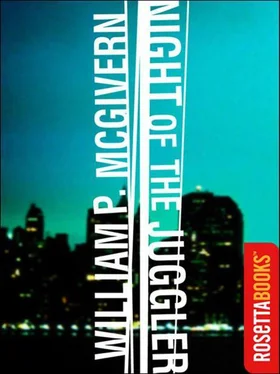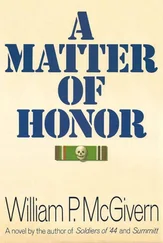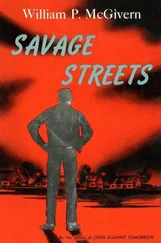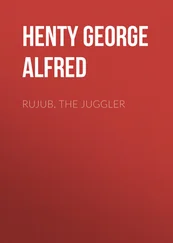William McGivern - Night of the Juggler
Здесь есть возможность читать онлайн «William McGivern - Night of the Juggler» весь текст электронной книги совершенно бесплатно (целиком полную версию без сокращений). В некоторых случаях можно слушать аудио, скачать через торрент в формате fb2 и присутствует краткое содержание. Жанр: Триллер, на английском языке. Описание произведения, (предисловие) а так же отзывы посетителей доступны на портале библиотеки ЛибКат.
- Название:Night of the Juggler
- Автор:
- Жанр:
- Год:неизвестен
- ISBN:нет данных
- Рейтинг книги:3 / 5. Голосов: 1
-
Избранное:Добавить в избранное
- Отзывы:
-
Ваша оценка:
- 60
- 1
- 2
- 3
- 4
- 5
Night of the Juggler: краткое содержание, описание и аннотация
Предлагаем к чтению аннотацию, описание, краткое содержание или предисловие (зависит от того, что написал сам автор книги «Night of the Juggler»). Если вы не нашли необходимую информацию о книге — напишите в комментариях, мы постараемся отыскать её.
Night of the Juggler — читать онлайн бесплатно полную книгу (весь текст) целиком
Ниже представлен текст книги, разбитый по страницам. Система сохранения места последней прочитанной страницы, позволяет с удобством читать онлайн бесплатно книгу «Night of the Juggler», без необходимости каждый раз заново искать на чём Вы остановились. Поставьте закладку, и сможете в любой момент перейти на страницу, на которой закончили чтение.
Интервал:
Закладка:
She could wind up with a Nobel Prize.
But Rusty Boyle, the emotional and romantic optimist, had been staggered and angered by Tonnelli’s proposal.
“But Jesus Christ! Supposing they discover a cure for cancer the day after he wastes himself?”
“Hate to break it to you like this, Rusty, but there really ain’t no Easter Bunny.”
Tonnelli’s phone rang a dozen or more times within the next half hour, and as the reports flowed in, he was able to visualize and analyze the action throughout the city.
From the 90th in Brooklyn came a signal reporting men lurking in alleys. The 90th was a pigeonhole area filled with Hasidic Jews, Puerto Ricans, and stubbornly nonmobile Italian immigrants.
Plainclothes and uniform cops picked up the suspects, who turned out to be bullyboy Nazi types on the scene, hoping to whip the heads of some militant Jews.
At the 48th Precinct in the Seventh Division in the South Bronx, the desk sergeant got a call from a hysterical woman who demanded the police do something about two mysterious men in the apartment above her who for days had been copulating around the clock to the accompaniment of liquid and obscene noises. They were, in fact, operating what ATF (the acronym for the federal agency controlling illegal alcohol, tobacco, and firearms) describes unofficially as a “nigger” still, a phrase pejorative in relation to quantity, although not necessarily to quality.
In Manhattan North (covering most of Harlem), the 26th Precinct reported a rape in an empty lot west of Tenth Avenue on 128th Street.
But the girl was in her twenties, and all three of her assailants had been apprehended and they were all black, or all “chocolate,” as the second laconic report had it.
East Harlem, Second Avenue near 116th Street. Twelve-year-old black girl reported missing. Found forty-five minutes later, stoned out of her skull in the men’s washroom of a hamburger joint near 110th and Central Park West.
Goddamn her black ass, Tonnelli thought, but he wasn’t thinking of a kid stoned in a hamburger joint, but Maybelle Cooper, who hadn’t returned his call, hadn’t bothered to set up a meeting at her pool hall or his HQ at the 19th. Milky Tichnor had checked in; so had Chapman and Solly Castro. All negative. But Samantha Spade hadn’t checked in.
He’d collar her for that, and he’d do it with savage pleasure. But why all the heat? he wondered. She probably knew why he never saw Adela anymore. It wasn’t Maybelie Cooper that Gypsy was furious with, the black kid with the computer head, who had taught his dumb sister basic arithmetic. No, it was Samantha Spade, who knew the city and its secrets as profoundly and bitterly as he did and who probably knew damned well that Adela’s Greek husband, Stav Tragis, ran a stolen car ring out of his used-car lots in Baltimore. .
The reports continued to come in, relayed from the switchboard operators of the 13th and 19th precincts to Lieutenant Tonnelli. In the Gypsy’s mind, he could envision the operations and embrace with his imagination the gross sprawl of the dark city. He watched rivers flowing, heard the scream of police sirens, saw the revolving red glare of dome lights, pictured cops in uniform with drawn guns, taking steps two at a time to investigate the tips and squeals now being funneled into the 13th and 19th precincts at what seemed to be a cyclical rate of increase.
Ninth near Fifth. Black man forcing black girl into a maroon Mark III.
Checked out negative. A pimp and his prossie.
Male Caucasian reported in women’s room at comfort station in Central Park. Arrested by a patrolman, cited on morals charge at the 22nd Precinct on Eighty-sixth Street (Central Park’s Transverse Number Three).
Missing child, Caucasian, male, age eight, residence on Fifty-fourth Street between First and Second avenues. Checked out negative.
Subject found at Manhattan central bus station, hoping for ride to Detroit to visit divorced father.
Paul Wayne of the New York Times had called, but Tonnelli had little for him. After the Juggler’s second ritualistic murder, the local press and television corps had scented a story of epic and explosive proportions in the works, given an affirmative to the one conditional “if.” If he killed again. .
That was their morbid but nonetheless professional concern. And so, in the third year, when the body of Trixie Atkins had been found in a loft in Greenwich Village with rope burns on her thighs and a dreadful knife wound across her jugular vein, the thrust of the story had been escalated to intense national coverage. A year later, when Jennie Goldman was murdered on the same date after suffering the agonizing brutalities that had been inflicted on the other three victims, the story had triggered a flamboyant and righteous explosion from the media, with parallels drawn to the Zebra and Zodiac slaughters in San Francisco, accompanied by the inevitable trailing inferences of police and political incompetence. There had been nonsubtle suggestions that if patrolmen weren’t “cooped up” (a police, expression for sleeping on duty) in the lobbies of closed theaters or basements of school buildings, and if the deputy chiefs and assistant chiefs who served at the pleasure of the commissioner, and hence were not protected by Civil Service, had the guts to enforce stringent curfews, to haul in every known sex offender over the past decade, and if the commissioner himself were not so politically ambitious and spent less time at international councils developing his themes of “brotherhood through law and order” and “the tyranny of the philosophy of numbers in police work,” well, the obvious inference was that the Juggler would have been caught long since and that Fun City would again and forever be entitled to its innocent and sustaining nickname.
The commissioner, in fact, had been in print that morning from Stockholm. On the third page of the Times , below the fold, he’d been quoted as saying to a meeting of delegates: “It has been said that one death is a tragedy, but that a million deaths is a statistic. Yes, that has been said and it was said by a man whose name was Joseph Stalin. And I repudiate his convictions as I repudiate him. . ”
Tonnelli was gut-certain they’d all be handed their heads by most of the media if the Juggler made it five in a row. And they’d deserve it. .
But the hue and cry and bullshit didn’t apply to Paul Wayne. He was a cynical middle-aged pro who knew his job, and Tonnelli trusted him. It was some other papers in town that would sprinkle blood across the front pages of their sheets if it would sell five additional copies.
So he gave Wayne what he had. The tips, how they checked out, the forces and equipment that were standing by.
The phone rang again. It was Sokolsky on the switchboard at the 19th.
“Lieutenant, we got a kid missing over in Brooklyn, from one of them crummy apartment buildings a block north of the Williamnsburg Bridge. Age eleven, a Puerto Rican girl. Cops from the division and precinct are on it.”
The Juggler had never struck outside Manhattan.
“What’s the kid’s name?”
“Trinidad Davoe.”
“Notify the precinct commander and the division inspector that we’re sending plainclothesmen over from the Thirteenth.”
“Check, Lieutenant.”
Before Tonnelli could refill his coffee cup and light another cigarette, Sokolsky was back on the line. “There’s nothing to it, Lieutenant, that Puerto Rican kid over in Williamnsburg.”
“What was it?”
“A crazy, I guess,” Sokolsky said. “Seems this kid got killed by a car a few years back. A milk truck, actually. The priest told the old lady that she really hadn’t gone away, lots of the guys in the precinct know about this, so the old lady goes to church and lights vigil lights and keeps reporting her daughter missing. One of the guys told me she keeps the kid’s bed turned down and gets up at night and finds it empty and calls the precinct to find her kid. It’s kind of sad.”
Читать дальшеИнтервал:
Закладка:
Похожие книги на «Night of the Juggler»
Представляем Вашему вниманию похожие книги на «Night of the Juggler» списком для выбора. Мы отобрали схожую по названию и смыслу литературу в надежде предоставить читателям больше вариантов отыскать новые, интересные, ещё непрочитанные произведения.
Обсуждение, отзывы о книге «Night of the Juggler» и просто собственные мнения читателей. Оставьте ваши комментарии, напишите, что Вы думаете о произведении, его смысле или главных героях. Укажите что конкретно понравилось, а что нет, и почему Вы так считаете.












